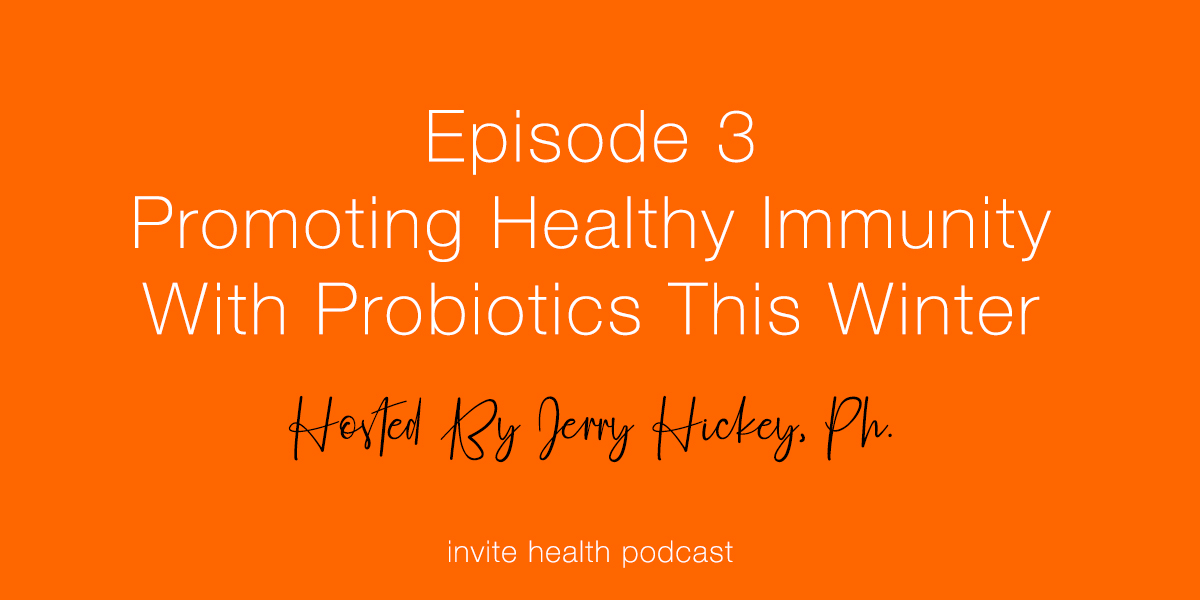Invite Health Podcast, Episode hosted by Jerry Hickey. Ph
Subscribe Today!
Our digestive tract is best known for digesting our food. But our digestive tract has another major activity – immunity. Welcome to the Invite Health Podcast! Today we will be discussing which specific strains of bacteria have been proven to help protect you from winter time infections.
The Importance of A Healthy Immune System
About 70% of our immune system is housed in our digestive tract. And it is strongly influenced by the trillions of bacteria living in our intestines. Some bacterial strains can throw off our immune system, which can damage our health and can contribute to autoimmune diseases and inflammation throughout the body, including our lungs. Other strains support and, in a number of manners, influence our immune system for the better.
The good news is science has unraveled some of the highly beneficial strains of bacteria that you can take in a Probiotic supplement that can help boost proper immune system function.
What is a Probiotic Supplement?
Probiotics are strains of bacteria that help support good health. Probiotics can be found in fermented foods, such as kefier or yogurt. They are also available through supplementation. But not all probiotic supplements are created equal.
When choosing a Probiotic supplement, you must make sure there are two strains of bacteria included. A great deal of research indicates that you need more than one stain of bacteria to reap the benefits that Probiotics have to offer. And you need at least one billion of each strain. They should also be CFU – colony forming units. This means they are still alive and, when consumed, they help promote good digestive health.
Now, at Invite Health, we’ve used a couple of tricks to help deliver good bacteria to you. We use a vegetable coating technology that protects the bacteria from heat and from stomach acids and enzymes in your digestive tract. This allows the bacteria to thrive in your digestive tract.
Essential Probiotic Strains
Bifidobacterium animalis subsp. lactis is a great example of a strain of bacteria that can improve your immune system function over the winter. It’s been proven to help protect you from colds and flu, maybe even prevent them. Lactobacillus rhamnosus, Bacillus coagulans, Bifidobacterium breve and Lactobacillus plantarum are also extremely important to help balance and improve the immune system.
One study from the University of Virginia School of Medicine studied 152 healthy volunteers and found that Bifidobacterium lactis protected the volunteers from getting a cold. Some study partipants took this strain of bacteria for 28 days and some others took a placebo. Then, the participants inhaled a cold virus and took either the probiotic or the placebo for five days after. Results showed that the probiotic bacteria strongly cut down on a number of people who caught a cold. For those who got sick while on the probiotic, their symptoms were much weaker and lasted for a much shorter duration.
This is just one of the reasons why a Probiotic is so vital for overall wellness, especially during the winter.
Thank you for tuning in to the Invite Health Podcast. You can find all of our episodes for free wherever you listen to podcasts or by visiting www.invitehealth.com/podcast. Make sure you subscribe and leave us a review! Follow us on Facebook, Twitter and Instagram at Invite Health today. We’ll see you next time on another episode of the Invite Health Podcast.
Key Topics:
- How your immunity and digestive symptoms are linked
- The important component of a probiotic supplement
- The difference between numerous stains of probiotic bacteria
- The benefit of probiotic strains throughout all stages of your life








